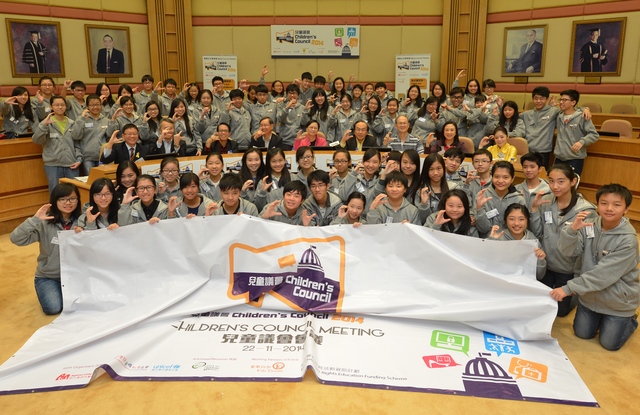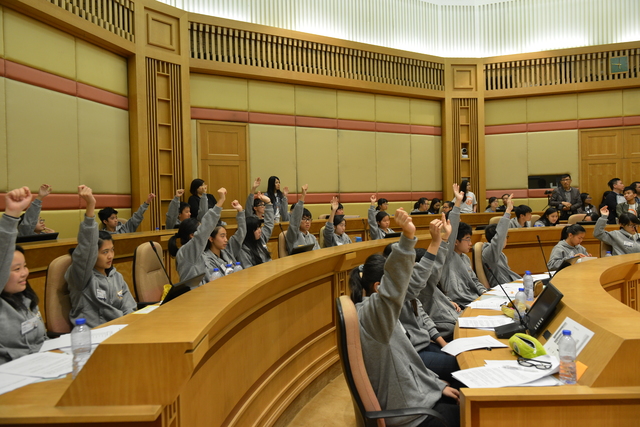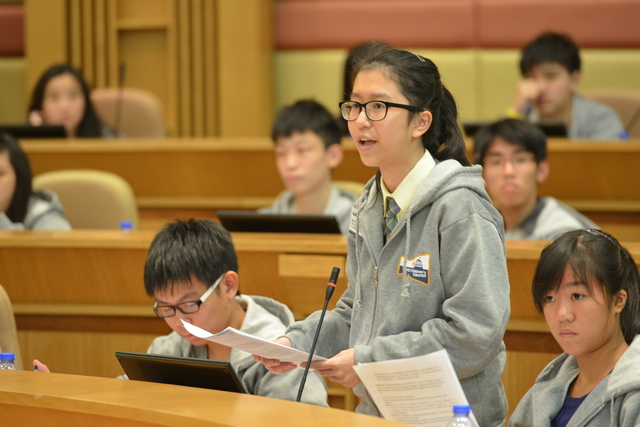69 Child Councilors discuss motions on child-related issues with legislators
2014-11-22
Calling for greater child participation in the formulation of education policies; strengthen integrated education practices to support students with special educational needs and improve the learning environment of grassroots children
 |
HONG KONG, 22 November 2014 –Today, 69 Child Councilors debated on three motions, including: i) ‘The government should allow greater child participation in the formulation of education policies’; ii) ‘The government should strengthen integrated education practices to support students with special educational needs’; and iii) ‘The government should improve the learning environment of grassroots children’. Legislative Councilors Dr Kenneth Chan Ka-lok, Ms Emily Lau Wai-hing, Dr Hon Priscilla LEUNG Mei-fun, Mr Ip Kin-yuen, Mr Cheung Kwok-che, Mr Alan Leong Kah-kit, Ms Cyd Ho Sau-lan, Mr Tony Tse Wai-chuen, Dr Leung Ka-lau and Dr Elizabeth Quat, Ms Maria Wong Yuen-ping, Chairman of The Special Education Society of Hong Kong, Ms Lillian Li, Director of SEN Rights, Mr Leung Kee-cheong, Headmaster of Fresh Fish Traders' School, Mr Wong Chi-yuen, Community Organizer of Society for Community Organization and other guests were present to exchange views with Child Councilors.
The meeting was held in the Hong Kong Baptist University, with reference to the rules and procedures of the Legislative Council. 69 Child Councilors, aged 12 to 17, were divided into three groups. Representatives from each group first moved the motions on the child-related issues, followed by an intense debate with other Child Councilors, and a Q & A session with Legislative Councilors and other panel guests. The Child Councilors then voted to determine the passage on a motion.
Regarding the first motion, ‘The government should allow greater child participation in the formulation of education policies’, Child Councilors indicated that education policies have profound impact on children. To formulate the most suitable education policies and curriculum, the Government, as the policymaker, should consider the opinions of children. Child Councilors conducted a survey for 181 children under aged 18 to explore their opinions on the current education policies. Over 70 per cent of the respondents hoped to play a part in formulating education policies, but up to 66 per cent said they had never expressed their opinions on education policies in school. Children nowadays have greater desire to participate in social affairs and policies. The Child Councilors thus suggested the Government to collect voices and opinions of children through various regular platforms, such as holding an annual ‘Secondary School Student Conference on Education Policies’ and setting up platform online. Apart from this, the Government should appoint education experts to collect children’s opinions at schools on a regular basis and encourage children’s participation in education affairs through publicity.
 |
Over 30,000 students with Special Educational Needs (SEN) study at mainstream schools in Hong Kong. These students need greater assistance to keep up with others. Therefore, for the second motion, ‘The government should strengthen integrated education practices to support students with special educational needs’, Child Councilors suggested the Government to establish an Integrated Education Law to ensure the implementation of Integrated Education. Apart from that, they suggested the government to strengthen school-based educational psychology services to identify the needs of SEN students and provide necessary treatments and assistance as early as possible. At the same time, the Government should improve the training and qualification accreditation for pre- and in-service teachers so that they can master the skills to teach SEN students. |
| With the huge poverty gap in Hong Kong, one in every five children lives in poverty. Although the Government has implemented poverty alleviation policies in recent years, they have failed to address the needs of grassroots children, for example, lack of English learning support, insufficient subsidized quota to attend tutorial and interest classes, shortage of suitable trainers so that grassroots children cannot benefit fully from the after school tutorial classes, inabilities of parents to support students’ learning; poor living environment affecting learning etc. To improve grassroots children’s learning environment in an all-round way, the Government should improve their living environment and extra-curricular activities support. |  |
After the meeting, Child Councilors and honourable guests joined the Closing Ceremony, which marked the successful completion of the Children’s Council in its tenth year. In the past four months, Child Councilors had 30 group meetings; they also conducted 19 interviews with government officials, legislators and people from various sectors; collected views from 801 children by questionnaires; along with desk top researches to prepare the three motions that will be compiled into a publication. The publications will be sent to the authorities concerned, and child-related organizations for government and society’s consideration and reference.
About the Children’s Council project:
Against Child Abuse, Hong Kong Committee on Children’s Rights and Hong Kong Committee for UNICEF have joined hands since 2000 to promote the United Nations Convention on the Rights of the Child (UNCRC) and children’s rights in Hong Kong. In 2002, the first Children’s Council of Hong Kong was established for children to step into the shoes of legislators to discuss and debate issues relating to children’s rights and fight for the rights of children. The Children’s Council project is sponsored by the HKSAR government and supported by Kids’ Dream, the first child-led organization in Hong Kong. Over the years, 31 child-related motions have been discussed.
About the United Nations Convention on the Rights of the Child (UNCRC):
This year is the 25th anniversary of UNCRC ratification, and the 20th anniversary of its implementation in Hong Kong. The United Nations General Assembly declared 20 November as the Universal Children’s Day in 1959 when the Declaration of the Rights of the Child was passed. This marked the beginning of the drafting of the United Nations Convention on the Rights of the Child (UNCRC) that has benefited children from all over the world of different background, status, religion, race and situation. The UNCRC, has now become the most widely adopted treaty by world nations, and was extended to Hong Kong in 1994. States Parties to the UNCRC are obliged to develop and undertake all actions and policies in the light of the best interests of the child, better international programmes striving for children’s well-being and support the work to protect children under particular conditions.
- END -









